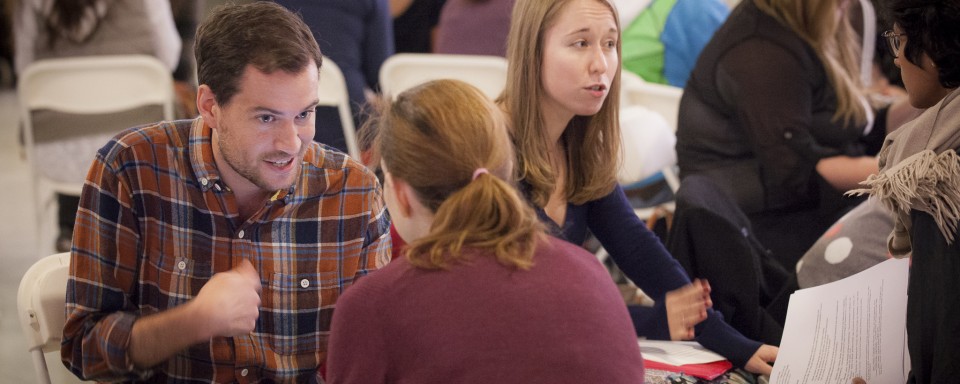by Cassandra Marsillo
Students of the Working Class Public History class reflected on their experiences of representing oral histories of Pointe-Saint-Charles which are part of the archive at the Centre for Oral History and Digital Storytelling.
I don’t know when I started becoming such a nervous wreck whenever someone utters the word “theatre.” I did theatre for one semester in CEGEP; I used to write and put on plays at family events with my cousins and sister as kids; I wouldn’t necessarily consider myself a shy person. Yet, the only word to describe my state of mind walking into class these last few weeks is anxious. This unease probably has less to do with theatre and more to do with feeling unprepared. I don’t do well with improv. I’m that person who ruins the improv skit. I’ll make a joke that no one understands, or I’ll just hover around like a fruit fly.
So, to avoid making Rany Pea seem like a fruit fly, because she’s not, I had my notes (or “script”) by my side, permanently creased by the amount of times I folded and unfolded it in my clammy hands. But as I sat down for my first speed date, I realized that I didn’t need them. My first round was not that great. Rany is francophone; therefore I decided to always speak in French, even if the other person wouldn’t understand me. I don’t know why I made this decision. I’m sure Rany speaks some level of English, but I just didn’t feel comfortable translating her words. Not only did I have to remember what I – or Rany – wanted to say, but I also had to do it all in French (a challenge I gave myself for this exercise), and all while a seemingly endless amount of voices echoed around me. I thought that Rany seemed much to scripted after this round. Especially after having met my first June O’Donnell, who was simply incredible, funny and relatable. I regretted preparing notes.
For the next few rounds, I focused on being Rany, rather than talking about Rany. It should have been way easier. We have a lot of basic things in common: we’re the same age, we’re both in university and we both live with our families. But when I speak French, you hear my accent. When I talk about my – Rany’s – life, I only have 90 seconds. It was so interesting when I met June O’Donnell a second, then a third time, because each time I met her, she was different. I wondered how someone else would’ve portrayed Rany. Would they have done a better job? Would they have thought the story about playing in the ruelle was as poignant as I did? Rany, unlike many people I’ve met or heard about from Pointe-Saint-Charles, is not super implicated in the community. She even says that she doesn’t feel a strong attachment to it, though she’s lived there her whole life. At first, I was a little disappointed. I wanted something juicy, exciting. But, as I was speed dating, I realized how interesting it was to be a young woman in an activity where the vast majority of my classmates were of an older generation. And unlike many of her fellow community members, Rany went to school outside Pointe-Saint-Charles. Her childhood memories are in the Plateau, or St-Michel.
A few weeks ago, during the Art History workshop, my group started speaking about the pride we see in Pointe-Saint-Charles. For example, I’m born in Saint-Leonard. When someone asks me where I’m from, though, I say “Montreal.” We noted how the answer would be different here: they would say “I’m from Pointe-Saint-Charles.” Rany opened her interview like this: “Mon nom est Rany Pea, chuis née à …” It was interesting to be a character that appreciates the changes going on at the moment, someone who has such a different outlook on the one I have somehow started to expect everyone from the Point to have. I think I’ve been looking at this community very one-dimensionally. Rany helped me realize this.
by Cassandra Marsillo
